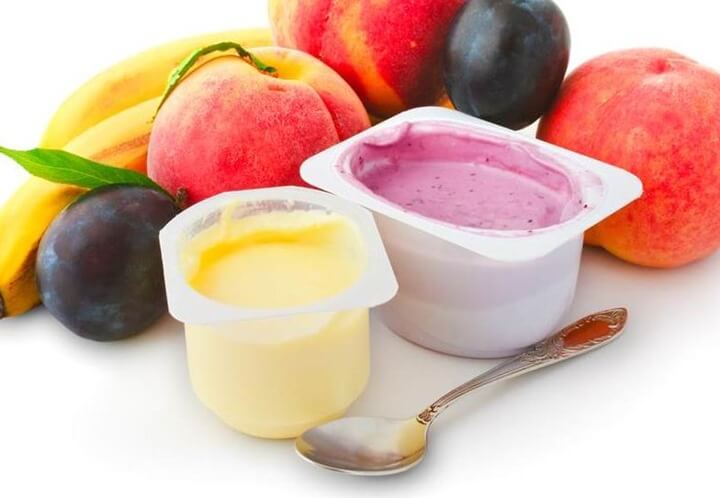The OCU Reports on the Best Yogurts


Written and verified by the psychopedagogue María José Roldán
Parents often give yogurt to their children as a snack or as an alternative to sweets. Yogurt is a healthy source of nutrition for adults and children alike. The Organization of Consumers and Users (OCU) in Spain has carried out a study to compare different brands and see what the best yogurts are in terms of nutrition.
This comparison concluded that most yogurt brands are good quality, rich, balanced and tasty. What distinguishes one brand from another are their nutritional properties. The study compared 15 different natural yogurts from the main brands found in different supermarkets in Spain.
In this article we will show a ranking of the best natural yogurts according to the OCU. If you want to learn what they are, keep reading.
Ranking of the Best Natural Yogurts According to the OCU

1. Nestlé Natural Yogurt
According to the OCU, the winner of best natural yogurt in terms of nutritional quality was Nestlé Natural Yogurt. It scored 75 points out of 100.
2. Día Natural Yogurt
The second best natural yogurt according to the OCU was the brand Día, which has a good value for its price. It scored 73 out of 100 points.
3. Carrefour Natural Yogurt
Carrefour’s natural yogurt brand came in third according to this ranking of the best yogurts, with a score of 71 out of 100 points.
4. Eroski Basic Natural Yogurt
Like Carrefour, Eroski yogurt also scored 71 points out of 100. These two are equal in terms of both quality and price.
5. Condis Natural Yogurt
Condis Natural Yogurt has a good rating of 69 out of 100. It is also very affordable.
6. Alteza (Euromadi) Natural Yogurt
The Alteza brand of yogurt also had a rating of 69 out of 100, like Condis.
7. Milbona (Lidl) Natural Yogurt
Milbona Natural yogurt, like the previous two brands, scored 69 out of 100 in the OCU’s global analysis.
8. Unide Natural Yogurt
The natural yogurt brand Unide scored 68 out of 100.
9. Hacendado (Mercadona) Natural Yogurt
Hacendado yogurt from Mercadona scored equal to the previous brand: 68 points out of 100. It also is very cheap when bought in a pack of 6.
10. Supersol Natural Yogurt
This yogurt scored 66 out of 100.
11. Gervais Natural Yogurt
Gervais Yogurt is of medium quality, according to the OCU. Its score was 62 out of 100.
12. Alipende (Ahorramás) Natural yogurt
Alipende yogurts are sold in Ahorra Más supermarkets. They scored 59 out of 100.
13. Danone Natural Yogurt
Danone’s natural yogurt, one of the best known and famous brands, has a score of 56 out of 100. This is one of the companies whose yogurts have worse nutritional quality than the previous ones mentioned.
14. Delisse (E. Leclerc) Natural yogurt
Delisse yogurts scored 53 out of 100. This is one of the worst performing yogurts according to this study by the OCU.
15. Milsani (Aldi) Natural Yogurt
Milsani natural yogurt, sold in Aldi supermarkets, has an average quality score of 53 over 100.
The Best Yogurts According to Category

- Price: Store brands cost half as much as more well-known yogurts.
- Flavor and texture: All brands have successfully surpassed this evaluation.
- Brand: The OCU found that the most famous yogurt brand on the market, Danone, skimps on nutrients. Their yogurts had fewer nutrients than the store brands. E. Lecler y Milsani from Aldi were also among the worst nutritionally.
- Quality: The best yogurt in terms of quality was Nestlé. This brand scored highest in all of the parameters that were evaluated. However, the best yogurts in terms of value for price were the brands Día, Carrefour and Eroski.
But Danone was not the only brand in a bad position according to this analysis. Among the worst brands were Delisse, sold in E. Lecler supermarkets, and Milsani from Aldi.
This was the OCU’s ranking of the best yogurts on the market. Now you know what brands have the best nutritional values and that, in terms of flavor and texture, you really can’t go wrong.
When it comes to choosing yogurt, keep this information in mind.
Main image courtesy of Tookapic.
Parents often give yogurt to their children as a snack or as an alternative to sweets. Yogurt is a healthy source of nutrition for adults and children alike. The Organization of Consumers and Users (OCU) in Spain has carried out a study to compare different brands and see what the best yogurts are in terms of nutrition.
This comparison concluded that most yogurt brands are good quality, rich, balanced and tasty. What distinguishes one brand from another are their nutritional properties. The study compared 15 different natural yogurts from the main brands found in different supermarkets in Spain.
In this article we will show a ranking of the best natural yogurts according to the OCU. If you want to learn what they are, keep reading.
Ranking of the Best Natural Yogurts According to the OCU

1. Nestlé Natural Yogurt
According to the OCU, the winner of best natural yogurt in terms of nutritional quality was Nestlé Natural Yogurt. It scored 75 points out of 100.
2. Día Natural Yogurt
The second best natural yogurt according to the OCU was the brand Día, which has a good value for its price. It scored 73 out of 100 points.
3. Carrefour Natural Yogurt
Carrefour’s natural yogurt brand came in third according to this ranking of the best yogurts, with a score of 71 out of 100 points.
4. Eroski Basic Natural Yogurt
Like Carrefour, Eroski yogurt also scored 71 points out of 100. These two are equal in terms of both quality and price.
5. Condis Natural Yogurt
Condis Natural Yogurt has a good rating of 69 out of 100. It is also very affordable.
6. Alteza (Euromadi) Natural Yogurt
The Alteza brand of yogurt also had a rating of 69 out of 100, like Condis.
7. Milbona (Lidl) Natural Yogurt
Milbona Natural yogurt, like the previous two brands, scored 69 out of 100 in the OCU’s global analysis.
8. Unide Natural Yogurt
The natural yogurt brand Unide scored 68 out of 100.
9. Hacendado (Mercadona) Natural Yogurt
Hacendado yogurt from Mercadona scored equal to the previous brand: 68 points out of 100. It also is very cheap when bought in a pack of 6.
10. Supersol Natural Yogurt
This yogurt scored 66 out of 100.
11. Gervais Natural Yogurt
Gervais Yogurt is of medium quality, according to the OCU. Its score was 62 out of 100.
12. Alipende (Ahorramás) Natural yogurt
Alipende yogurts are sold in Ahorra Más supermarkets. They scored 59 out of 100.
13. Danone Natural Yogurt
Danone’s natural yogurt, one of the best known and famous brands, has a score of 56 out of 100. This is one of the companies whose yogurts have worse nutritional quality than the previous ones mentioned.
14. Delisse (E. Leclerc) Natural yogurt
Delisse yogurts scored 53 out of 100. This is one of the worst performing yogurts according to this study by the OCU.
15. Milsani (Aldi) Natural Yogurt
Milsani natural yogurt, sold in Aldi supermarkets, has an average quality score of 53 over 100.
The Best Yogurts According to Category

- Price: Store brands cost half as much as more well-known yogurts.
- Flavor and texture: All brands have successfully surpassed this evaluation.
- Brand: The OCU found that the most famous yogurt brand on the market, Danone, skimps on nutrients. Their yogurts had fewer nutrients than the store brands. E. Lecler y Milsani from Aldi were also among the worst nutritionally.
- Quality: The best yogurt in terms of quality was Nestlé. This brand scored highest in all of the parameters that were evaluated. However, the best yogurts in terms of value for price were the brands Día, Carrefour and Eroski.
But Danone was not the only brand in a bad position according to this analysis. Among the worst brands were Delisse, sold in E. Lecler supermarkets, and Milsani from Aldi.
This was the OCU’s ranking of the best yogurts on the market. Now you know what brands have the best nutritional values and that, in terms of flavor and texture, you really can’t go wrong.
When it comes to choosing yogurt, keep this information in mind.
Main image courtesy of Tookapic.
All cited sources were thoroughly reviewed by our team to ensure their quality, reliability, currency, and validity. The bibliography of this article was considered reliable and of academic or scientific accuracy.
- Added sugars in kids’ diets: How much is too much? (2019). American Academy of Pediatrics News. Consultado el 16 de marzo de 2023. https://publications.aap.org/aapnews/news/7331?autologincheck=redirected
- Astrup, A., Wium, Geiker, N. R., et al. (2019). Advances in Nutriton. Fuul-fat and fermented dairy products on cardiometabolic disease: food is more than the sum of its parts. Advances in Nutrition. 10 (5): 924S-930S. https://www.ncbi.nlm.nih.gov/pmc/articles/PMC6743821/
- Federación Española de la Nutrición (FEN). (s.f.). Yogur. Disponible en: https://fen.org.es/MercadoAlimentosFEN/pdfs/yogur.pdf
- Fernandez, M. A., Fisberg, M., et al. (2017). Role of yogurt in the nutrition and health of children and adolescents. In Shah, N (Ed.). Yogurt in Health and Disease Prevention (pp. 491-505). Academic Press. Disponible en: https://www.sciencedirect.com/science/article/pii/B9780128051344000286
- Fernandez, M. A., Panahi, S., Daniel, N., Tremblay, A., & Marette, A. (2017). Yogurt and cardiometabolic diseases: a critical review of potential mechanisms. Advances in Nutrition, 8 (6), 812-829. https://www.sciencedirect.com/science/article/pii/B9780128051344000286
- Fiore, G., Di Profio, E., Sculati, M., Verduci, E., & Zuccotti, G. V. (2022). Health effects of yogurt consumption during paediatric age: a narrative review. International Journal of Food Sciences and Nutrition, 73 (6), 738-759. Disponible en: https://pubmed.ncbi.nlm.nih.gov/35450518/
- Gil-Campos, M., San José, González, M. A., et al. (2015). Use of sugar and sweeteners in children’s diets. Recommendations of the Nutrition Committee of the Spanish Association of Pediatrics. Anales de Pediatría. 83 (5): 353.e1-353.e7. https://www.analesdepediatria.org/en-use-sugars-sweeteners-in-children39s-articulo-S234128791500201X
- Gómez, M. (2018). Recomendaciones de la Asociación Española de Pediatría sobre la Alimentación Complementaria. Comité de Lactancia Materna y Comité de Nutrición de la Asociación Española de Pediatria. Consultado el 22 de febrero de 2023. Disponible en: https://www.aeped.es/sites/default/files/documentos/recomendaciones_aep_sobre_alimentacio_n_complementaria_nov2018_v3_final.pdf
- Kouvelioti, R., Josse, A. R., & Klentrou, P. (2017). Effects of dairy consumption on body composition and bone properties in youth: a systematic review. Current developments in nutrition, 1(8), 1-12. Disponible en: https://academic.oup.com/cdn/article/1/8/e001214/4735237?login=false
- Moore, J. B., Horti, A., Fielding, B. A. (2018). Evaluation of the nutrient content of yogurts: a comprehensive survey of yogurt products in the major UK supermarkets. BMJ Open. 8: e021387. https://bmjopen.bmj.com/content/8/8/e021387.citation-tools
- Organización Mundial de la Salud (OMS). (2015). Directriz: ingesta de azúcares para adultos y niños. Consultado el 22 de febrero de 2023. https://apps.who.int/iris/bitstream/handle/10665/154587/WHO_NMH_NHD_15.2_spa.pdf?sequence=2&isAllowed=y
This text is provided for informational purposes only and does not replace consultation with a professional. If in doubt, consult your specialist.








